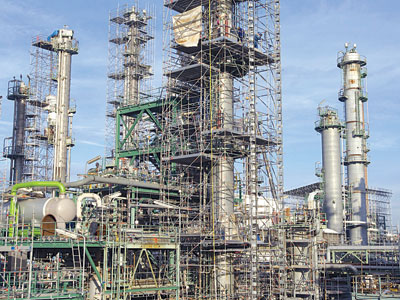Allied workers, contractors at PHRC disappointed at Ojulari’s visit detouring refinery

Allied workers, at the Port Harcourt Refining Company (PHRC) made up of retailers, engineers, and contractors under the name of HOSCOM Bulk Retailers Association of the Port Harcourt Refinery, say they are deeply disappointed over the recent visit to Rivers State by Bayo Ojulari, the group chief executive officer of the Nigerian National Petroleum Company Limited (NNPC), without a stop at the declining refinery. Rather, he chose to visit the Nigeria LNG facility in Bonny.
PHRC, with a nameplate refining capacity of 220,000 barrels per day (bpd) can better be described as waning petroleum asset, despite receiving $1.5 billion as rehabilitation costs at the twilight of former president Mohammadu Buhari’s administration.
The refinery had missed restarting six times, before NNPC under Mele Kyari (former GCEO) declared it fit to resume production. Since then till date, operations have been in fits-and-starts. Only last month, Ojulari made a fleeting statement of government’s intention to put up the refinery for sale, only to detour.
The HOSCOM executive members: Sunny Nkpe, Joseph Obele, Emmanuel Inimgba, Tekena Ikpaki, and Dickson Obelley, described Ojulari’s decision to visit the Nigeria LNG facility in Bonny, ignoring the PHRC was “a slap in the face” to the workers and management of the refinery.
“While the LNG facility remains an important national asset, the Port Harcourt Refinery plays a vital role in Nigeria’s refining capacity; and deserves equal recognition and support,” they said.
“A visit to the Port Harcourt Refinery by Engr. Bayo Ojulari would have served as a morale booster and motivation to the rehabilitation team and contractors working tirelessly to restore the facility to optimal capacity,” the HOSCOM group said in a statement released in Port Harcourt.
The group further warned that Ojulari’s omission signaled “a worrying lack of interest in the refinery’s functionality, raising questions about the priorities and commitment of NNPC leadership to its rehabilitation”.
They called on the NNPC boss to revisit his itinerary and pay an assessment visit to the refinery to acquaint himself with its operations and challenges.
Indeed, some energy analysts who spoke in Port Harcourt on condition of anonymity said, Port Harcourt refinery’s predicament climaxes both NNPC’s chronic governance failures, and the broader Nigerian government’s growing fragmentation in carving a sustainable domestic refining capacity.
Long before the advent of the President Bola Tinubu administration, and his infamous “subsidy is gone” inaugural speech on May 29, 2023, Nigeria had been on a massive importation 100 per cent of all its petroleum products needs, despite being Africa’s top oil producer.
Recently, the Dangote Refinery, built at the cost of $20 billion, which aims to transform Nigeria from an importer to a net exporter of refined petroleum products, has faced months of supply shortfalls following refusal by the international oil companies (IOCs) operating in Nigeria to prioritize domestic sales. Instead, they prefer the more lucrative international export markets.
Unsatisfied by a somewhat existential threat to his refinery’s operations, Aliko Dangote, president of Dangote Refinery, has turned to the courts to seek redress. He has filed lawsuits against the Nigerian Upstream Petroleum Regulatory Commission (NUPRC), seeking regulatory enforcement to compel the IOCs to sell their crude domestically before exporting.
“If Nigerian oil is not available to Nigeria’s largest refinery, then where does that leave our energy security?” a Dangote top official asked rhetorically.
It is yet uncertain what will come out of Dangote’s litigation. For now, reports say the African business mogul is looking to direction of Russian crude oil as a last resort after repeated failures to secure feedstock from local oil producers in Nigeria.
COURTESY: businessamlive

Post Comment